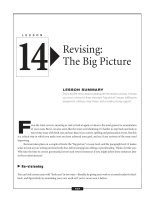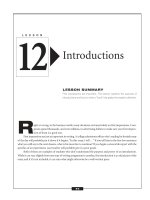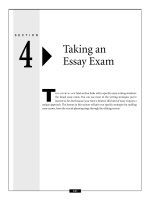Write Better Essays - Taking an Essay Exam
Bạn đang xem bản rút gọn của tài liệu. Xem và tải ngay bản đầy đủ của tài liệu tại đây (151.21 KB, 23 trang )
141
SECTION
4
Taking an
Essay Exam
T
his fourth and final section deals with a specific essay-writing situation:
the timed essay exam. You can use most of the writing strategies you’ve
learned so far, but because your time is limited, this kind of essay requires a
unique approach. The lessons in this section will give you specific strategies for tackling
essay exams, from the crucial planning stage through the editing process.
W
riting an essay in an exam situation, with the clock ticking, is very different from other types
of essay writing. Of course, the fundamentals of good writing don’t change (which is why Sec-
tions 1–3 apply to any type of essay). What changes is your approach. When you have just 25
minutes (SAT), 30 minutes (ACT), or an hour (many state tests, such as Regents’), you must use your time wisely.
Every minute counts.
The way to take full advantage of every minute is to prepare; gather all available information about the test
beforehand, checking the resources in the Additional Resources section of this book, as well as your exam’s web-
site. Understand the type of prompt you’ll find on the test, know how to organize your thoughts, and be able to
expand prewriting notes into paragraphs. Take timed practice exams not only to get used to the situation, but also
to identify your strengths and weaknesses. When you take a timed essay exam, preparation can mean the differ-
ence between a great score and a poor one.
LESSON
Preparing for
an Essay Exam
LESSON SUMMARY
Essay exams are stressful. You have to come up with a well-written
piece under a strict time restraint in a room crowded with other stu-
dents. How can you alleviate some of that stress and walk into the test-
ing room with confidence? The answer is preparation.
18
143
Types of Exams
Spend time learning the general features of the essay you’ll be taking. Understand the topics and what scorers will
be looking for. Study the instructions for your essay carefully (they’re all online)—think of how much time you’ll
save during the exam if you don’t have to read them. Finally, visit the test website to get the most up-to-date infor-
mation about topics and any changes made to the tests.
ACT
The ACT Plus Writing Test is optional. Some schools require the test, so check with those you plan on applying
to before you make your decision to register for it. The essay is written in response to a prompt concerning an issue
of relevance to high school students. You’ll need to take a stand on that topic, support your point of view, and pres-
ent a counterargument.
Here’s a sample prompt:
In an effort to reduce juvenile violence and crime, many towns have chosen to enforce curfews on minors under the
age of eighteen. These curfews make it illegal for any minor to loiter, wander, stroll, or play in public streets, highways,
roads, alleys, parks, playgrounds, or other public places between the hours of 10:00
P
.
M
. and 5:00
A
.
M
. These curfews
also make it illegal for parents or legal guardians to allow minors to congregate in certain public places unsupervised.
Those who support these curfews believe they would reduce community problems such as violence, graffiti, and drugs,
and would force parents and guardians to take responsibility for their children’s whereabouts. Those who oppose cur-
fews for minors claim these laws violate the Fourteenth Amendment rights of life and privilege for U.S. citizens. They
also believe that such curfews stereotype minors by presupposing that citizens under the age of eighteen are the only
people who commit crimes.
In your essay, take a position on this question. You may write about either one of the two points of view given, or you
may present a different point of view on this topic. Use specific reasons and examples to support your position.
Two trained readers will score your essay on a scale of 1–6; the highest possible score is a 12, and the lowest
is a 2. Those readers will evaluate how well you:
■
supported your position
■
maintained focus on the topic
■
developed and organized your position logically
■
supported your ideas
■
adhered to the rules of standard written English
For the latest information about the test, check www.act.org.
GED
The General Educational Development test contains a 45-minute writing section in which test takers must
develop an expository essay that includes personal observations, knowledge, and experience. The typical GED essay
is about 250 words in length, written on your choice of five topics. A list of possible topics, as well as some test-
–PREPARING FOR AN ESSAY EXAM–
144
taking hints, may be found at The official GED Testing Ser-
vice website offers links to your jurisdiction’s testing program, which may differ slightly from that of other states.
Check www.acenet.edu/clll/ged/index.cfm for the latest information.
Those who score the GED essay read between 25 and 40 essays an hour. They look for:
■
well-focused main points
■
clear organization
■
development of ideas
■
appropriate sentence structure and word choice
■
correct punctuation, grammar, and spelling
SAT
With just 25 minutes to write, you won’t be expected to turn in a final draft essay when taking the SAT. Minor errors
in grammar, usage, and mechanics are not weighed against you. Scorers instead read the essay to get an overall
impression of your writing ability. They look for evidence of critical thinking: how well you responded to the topic,
developed a point of view, and used appropriate examples and evidence to support your position. Is your essay
clearly focused, and does it transition smoothly from one point to the next? Do you show evidence of having a
varied and intelligent vocabulary?
You’ll get either a “response to a quote” or a “complete the statement” prompt. The former has one or two
quotes on a topic—you’ll need to take a stand on that topic in your essay. The latter asks you to fill in the blank
in a sentence, and write an essay based on your completed sentence. The latest information on the SAT essay may
be found at www.collegeboard.com.
Regents’ and Other Exit Exams
More than 25 states, including California, Alaska, North Carolina, and Texas, require a passing grade on an exit
exam to be eligible for high school graduation. These tests vary, so it is important to get specific information about
the test you are preparing to take. However, most exit exams allow 60 minutes to develop an essay based on one
of a choice of topics. A list of topics for Georgia’s Regents’ exam, for example, may be found at
www.gsu.edu/~wwwrtp/topics.htm (but remember to check with your school regarding the test you will be
given).
A typical exit essay is approximately 1,500 words. Possible topics include responses to literature, biograph-
ical narratives, and even business letters. Those who grade exit essay exams ask:
■
How well did you address the topic?
■
Were your ideas organized?
■
Did you develop major points, and support them with details and examples?
■
Were your word choices and sentence structure effective and varied?
■
How consistent was your style (paragraphing), grammar, spelling, and punctuation?
■
Did you express yourself freshly and uniquely?
–PREPARING FOR AN ESSAY EXAM–
145
Types of Essays
You have been assigned dozens of essays during high school. They might have been a response to something you
read, an argument about a particular topic, or an explanation of an event or other subject of study. In fact, there
are countless types of essays. However, almost all timed essay exams fall into one of two major categories: expos-
itory or persuasive. In fact, the ACT and SAT call exclusively for persuasive essays.
Expository
An expository essay gives directions, instructions, or explanations. It informs by presenting the writer’s knowl-
edge about the topic to the reader. You might be asked to define, compare and/or contrast,or explain cause and effect.
In fact, think of the verbs used in your topic as key words that clue you in to the fact that you are being asked to
write an expository essay. These key words include:
■
Compare: examine qualities or characteristics to note and discuss similarities and differences
■
Contrast: examine two or more ideas, people, or things, stressing their differences
■
Define: give a clear, authoritative meaning that identifies distinguishing characteristics
■
Describe: relate the details that make the subject in question unique
■
Diagram: create a graphic organizer that explains your answer
■
Discuss: examine the subject(s) thoroughly, and give a detailed explanation of its strengths and weaknesses
■
Enumerate: determine the points you must make, and present them in a list or outline form
■
Explain: clarify meaning in a straightforward fashion, paying attention to the reasons for a situation
■
Illustrate: use examples, graphic organizers, evidence, or analogies to give meaning or answer a problem
■
Interpret: explain the meaning of something or solve a problem using personal opinions, judgments, or
reactions
■
List: see enumerate
■
Narrate: explain an occurrence by describing it as a series of chronological events
■
Outline: describe in an organized fashion, systematically, highlighting only the major points (details not
necessary)
■
Relate: explain the associations or connections between two or more things, events, circumstances, or even
people; may also be used to mean narrate (see narrate)
■
Recount: see narrate
■
Review: critically examine the topic, event, idea, or thing in question, discussing major points and their
strengths and/or weaknesses
■
State: express major points concisely, without using examples or details
■
Summarize: see state
■
Trace: similar to narrate; describe the chronology of an event to reveal its meaning
–PREPARING FOR AN ESSAY EXAM–
146
Persuasive
In a persuasive,or argument, essay, you choose one idea and show why it is more legitimate or worthy than
another. Your purpose is not to merely show your side, but to convince your reader why your side is best. In order
to convince effectively, you must base your argument on reasoning and logic. The most important strategy for the
persuasive essay is to choose the side that has the best, or most, evidence. If you believe in that side, your argu-
ment will most likely be even stronger (although you don’t have to believe in it to write a good essay).
An important component of a persuasive essay is the inclusion of other sides or points of view. In fact, the
scoring rubric for the ACT essay notes specifically that readers will be looking for counterarguments. Counter-
arguments are presented in order to be refuted or weakened, thereby strengthening the case for your side. How-
ever, it is important to use reasoning and understanding to refute them. If you don’t sound fair, or simply present
emotional reasons why your side is best, you have weakened your argument. You must show that your idea is most
legitimate in part because other ideas are weak or incorrect.
Key verbs that will help you identify a call to write a persuasive essay include:
■
Criticize: express your judgment about the strengths and weaknesses of your topic, and draw conclusions
■
Evaluate: assess the topic based on its strengths and weaknesses, drawing conclusions
■
Justify: defend or uphold your position on the topic, using convincing evidence
■
Prove: confirm or verify that something is real or true using evidence, examples, and sound reasoning
147
The scorers of every type of timed essay agree on one significant point: You must support your essay with details,
examples, and evidence. Not only will they strengthen your argument, but they will make your writing come alive.
Common advice for essay exam takers is to include at least one sentence in each paragraph that begins with
the words For example. Compare these sentences:
High school seniors should be allowed open campuses, on which they can arrive in time for their first class, leave
during free periods, and come back to school for their other classes. There is no reason to treat high school sen-
iors like children by making them stay in school all day when they don’t have classes to attend all day. Seniors
can handle the extra responsibility.
High school seniors should be allowed open campuses, on which they can arrive in time for their first class, leave
during free periods, and come back to school for their other classes. Seniors are given freedom and responsi-
bility in many other areas of their lives; for example, the ability to drive a car. Seniors are also permitted to vote,
and to prepare for their futures through the college admissions process or vocational training.
The first example uses generalizations and unsubstantiated claims (“no reason to treat [them] . . . ,” “can handle
the extra responsibility”), which weaken the argument. The second uses evidence, such as the responsibility of
driving and voting, to make the case for open campuses. Remember to back up what you say with evidence,
details, and other types of examples.
The Best Way to Achieve a High Score
Set a schedule that allows for each step in the writing process:
■
Spend the first
ᎏ
1
4
ᎏ
of your time planning your essay.
■
Spend
ᎏ
1
2
ᎏ
of your time drafting your essay.
■
Spend the last
ᎏ
1
4
ᎏ
of your time editing and proofreading your essay.
Time Management
Understanding Your Prompt
This advice might seem obvious, but it aims to correct one of the most common mistakes made on essay exams:
Spend time understanding the type of prompt you’ll encounter. Remember that your score depends in large part
on how well you address that prompt (both the ACT and SAT essay directions note that an essay written off topic
will be scored 0; a GED essay that fails to adequately address the prompt also gets the lowest score—a 1). Prepa-
ration materials, both in print and on the Internet, are available for every essay exam, so it’s easy to familiarize
yourself with them.
Many students fail to address the prompt because they didn’t understand what it was asking them to write
about. The best way to determine whether you understand it is to put the prompt in your own words, and then
compare yours with the original. Are they nearly the same in meaning? If you have trouble with this exercise, try
circling the verbs (key words) in the original prompt. These are the same key words you will look for during the
exam. When you understand the key words, you can more easily write the type of essay required by the prompt.
Budgeting Your Time
As you prepare to take your exam, familiarize yourself with its timing. Whether you have 25 minutes or an hour,
you should complete three distinct tasks: planning, writing, and revising. The writing stage will take the longest,
and, for essays that don’t hold grammatical and spelling mistakes against you, the revising stage will be the short-
est. But every essay should include all three.
Planning
Section 1 covered prewriting. Review in particular Lessons 3 and 4, and decide, based on a few practice essays, which
brainstorming technique works best for you in a timed situation. Knowing exactly what you will do when you begin
the exam will not only help you save time, but will also take some of the pressure off, too. Some exit exams (such
as Indiana’s Graduation Qualifying Exam) judge your prewriting notes, outlines, and other graphic organizers,
making it even more important to choose a strategy that you know you do well ahead of time. Even if you are tak-
ing the SAT, and have just 25 minutes for your essay, spend the first 3–5 planning.
Your planning time, no matter which prewriting strategy you use, should involve the formation of a thesis state-
ment and three or four main points. Any supporting evidence for, or examples of, those points should be included.
Once you begin planning, don’t be tempted to switch topics, which will waste valuable writing time. Allow a few min-
utes to think through the topic. You may cross off main points that don’t work, or add a new one or two as you go.
–PREPARING FOR AN ESSAY EXAM–
148
Practice
Set a timer for five minutes. Draft a thesis statement and create an outline for the following sample SAT essay
prompt:
Some people say there are no more heroes, but I see plenty of heroic people all around me. One person I consider a hero
is .
Fill in the blank in the sentence. Write an essay in which you explain your answer.
In Short
The time you spend planning for and preparing to take an essay exam can mean the difference between a great
score and a poor one. Do your homework by researching your exam: Understand how it’s scored, what type of
prompt(s) you’ll encounter, what the directions say, and even how much space you’ll be given to write in. Learn
how to respond quickly to a prompt by practicing: Come up with a thesis statement and outline in just five min-
utes or less.
–PREPARING FOR AN ESSAY EXAM–
149
Gather a couple of sample prompts online or from other books about your exam (see the Additional
Resources section for a list of books and online resources). Set the timer for five minutes and practice
writing thesis statements and outlines. The more you practice, the easier it will be to plan your essay
on exam day.
Skill Building until Next Time









